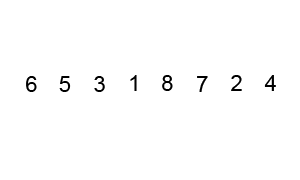Sorting algorithms are some of the earliest that you typically get exposed to in Computer Science. It may not be immediately obvious how important they are, but it shouldn't be hard to think of some examples where your computer needs to sort some massive datasets during everyday operations.
One of the simpler (but more processor-intensive) ways of sorting a group of items in an array is bubble sort, where each element is compared to the one next to it and they are swapped if the one on the left is larger than the one on the right. This continues until the array is eventually sorted.
Check out this video from Harvard's CS50x on Bubble Sort.
There's also an entry on Bubble Sort on Wikipedia that's worth taking a look at.
-
Build a method
#bubble_sortthat takes an array and returns a sorted array. It must use the bubble sort methodology (using#sortwould be pretty pointless, wouldn't it?).> bubble_sort([4,3,78,2,0,2]) => [0,2,2,3,4,78] -
Now create a similar method called
#bubble_sort_bywhich sorts an array but accepts a block. The block should take two arguments which represent the two elements currently being compared. Expect that the block's return will be similar to the spaceship operator you learned about before -- if the result of the block is negative, the element on the left is "smaller" than the element on the right.0means they are equal. A positive result means the left element is greater. Use this to sort your array.> bubble_sort_by(["hi","hello","hey"]) do |left,right| > left.length - right.length > end => ["hi", "hey", "hello"]
You learned about the Enumerable module that gets mixed in to the Array and Hash classes (among others) and provides you with lots of handy iterator methods. To prove that there's no magic to it, you're going to rebuild those methods.
-
Create a script file to house your methods and run it in IRB to test them later.
-
Add your new methods onto the existing Enumerable module. Ruby makes this easy for you because any class or module can be added to without trouble ... just do something like:
module Enumerable def my_each # your code here end end -
Create
#my_each, a method that is identical to#eachbut (obviously) does not use#each. You'll need to remember theyieldstatement. Make sure it returns the same thing as#eachas well. -
Create
#my_each_with_indexin the same way. -
Create
#my_selectin the same way, though you may use#my_eachin your definition (but not#each). -
Create
#my_all?(continue as above) -
Create
#my_any? -
Create
#my_none? -
Create
#my_count -
Create
#my_map -
Create
#my_inject -
Test your
#my_injectby creating a method called#multiply_elswhich multiplies all the elements of the array together by using#my_inject, e.g.multiply_els([2,4,5]) #=> 40 -
Modify your
#my_mapmethod to take a proc instead. -
Modify your
#my_mapmethod to take either a proc or a block. It won't be necessary to apply both a proc and a block in the same#my_mapcall since you could get the same effect by chaining together one#my_mapcall with the block and one with the proc. This approach is also clearer, since the user doesn't have to remember whether the proc or block will be run first. So if both a proc and a block are given, only execute the proc.
